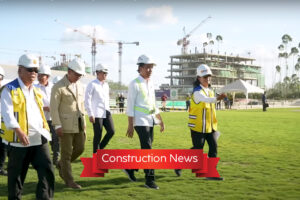
Jakarta Governor Anies Baswedan commences ground breaking for the construction of a wastewater treatment plant (IPAL) fitted with the newest technology called Moving Bed Biofilm Reactor (MBBR) at Krukut, Karet Setiabudi, South Jakarta.
This IPAL is not only a facility for liquid waste treatment, it is also fitted with facilities for education and entertainment. The building also has human-centric aesthetics.
“This IPAL is crucial for Jakarta as a major city that needs to process its waste seriously. With this wastewater treatment plant, it is expected that liquid waste in Jakarta can be processed to be reused,” Anies said as quoted from the press conference of Jakarta Information and Documentation Management Official (PPID) on Sunday (8/12).
This facility is a continuation of modern IPAL operation that has started since January 2019. Previously, PD PAL Jaya used conventional techniques and meddled in flood control.
Furthermore, Krukut IPAL, the IPAL with the latest technology in Indonesia, will be designed as an education centre to make students, citizens, and even waste operators from other cities learning about waste treatment development easier.
“This facility is designed from scratch so that the design will make it easier [for the dam] to be an education centre. So, there will be lanes and locations that are open for public so they can see the [waste treatment] process and procedure. Furthermore, the dam is located at a strategic location, which is right next to Jalan Sudirman, so anyone can come to learn and see the waste treatment process,” he explained.
MBBR Technology
PD Pal Jaya President Director Subekti, as Krukut MBBR IPAL operator, claimed that MBBR technology could process liquid waste into water by 100% to be reused by the public.
“With MBBR technology, liquid waste can be turned into clean water, and we plan to recycle the [the waste to be] 100% [clean water],” Subekti said when he was met after the ground breaking of Krukut MBBR IPAL on Sunday (8/12).
Krukut MBBR IPAL is planned to be finished by the middle of 2021. It will process liquid waste from Senayan, SCBD, Gatot Subroto, and Bendungan Hilir (Benhil).
Furthermore, Subekti mentioned that Krukut MBBR IPAL would be built vertically as land in Jakarta is scarce, and it will be designed as an edutainment facility for the public.
“So, there will be lanes and locations that are open for public so that they can see the [waste treatment] process and procedure, not just the process inside the plant. So, [waste] from households and industries will return back to nature. This is the facility prepared to process [that cycle],” he said.
This IPAL, that is fitted with MBBR technology and is located in Krukut, will be built to be 20 metres high on a land that 1,200 square metres.
This technology has a capacity of 8,640 square metres. Hence, it will produce 100 litres per second of water daily, which is reckoned to be enough for city-scale waste treatment plants.
To finish the construction on time, Subekti said that his company would report the construction progress every week, following the instruction of Jakarta Governor Anies Baswedan.
“We will surely [publish] reports every week in the official website or other social medias,” he said.
Subekti revealed that this IPAL that is fitted with MBBR technology will accommodate waste from Gatot Subroto, Bendung Hilir and Senayan.
Subekti explained that the waste would be processed and turned into clean water to be used by the Forestry Department to water plants and the Firefighting Department to extinguish fires.
“The water will be sold to buildings around the MBBR [IPAL] to flush toilets. Krukut IPAL will leave half a square metre of sludge after recycling,” he said.
The conventional technique has a weakness as it needs a large location, so it is inefficient. Meanwhile, Krukut IPAL only need 2,000 square metres, which is suitable for the scarcity of lands in cities.
There are currently two approaches for waste treatment that are implemented by PD Pal Jaya, namely pipe and non-pipe. For the pipe approach, zone 0 will be developed by constructing nine construction packages for the main pipe, seven DED packages for the secondary pipe, operating Setiabudi IPAL since January 2019, and constructing Krukut IPAL.
Wastewater treatment quality will be improved by providing IPALs with MBBR technology, which is a reactor where microorganisms grow on a specific surface to form a film layer that acts as a filter for the liquid waste. The MBBR technology has a capacity of 250 litres per second.
Besides that, wastewater pipe cleaning, network maintenance tool provision to serve customers at tight alleys, on-site development through septic tank revitalisation, communal septic tank and interceptor maintenances, and GIS arrangement will be carried out. Areas that the pipe system already reached are Setiabudi District, Tebet District, Mega Kuningan area, SCBD area, Gatot Subroto, Senayan, Bendungan Hilir, and Karet areas.
Meanwhile, the non-pipe approach is implemented by constructing BIOPAL septic tanks (type 1, type 2, and deal packages) to accommodate liquid waste of households and small businesses, constructing mini-communal septic tank and interceptor at Item River, improving Duri Kosambi Sewer Treatment Plant (IPLT) and Pulo Gebang IPLT, and disseminating scheduled pumping services through Grebeg L2T2 program.
The number of PD PAL Jaya customers in 2019 is 2,715 customers per unit (12,846,151 m2). Meanwhile, until the third quarter of 2019, wastewater services reached 22.08% or served 1,286,415 Jakarta residents.
Kindly fill in the form below, our consultant will get in touch as soonest.
Alternatively, you can call at +62 815 629 0000 (whatsupp available) or email to info@bizindo.com


 20% off today. Whatsapp us!
20% off today. Whatsapp us!